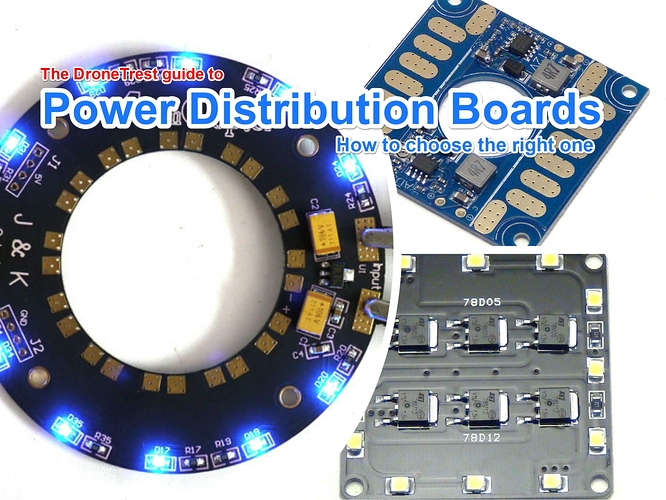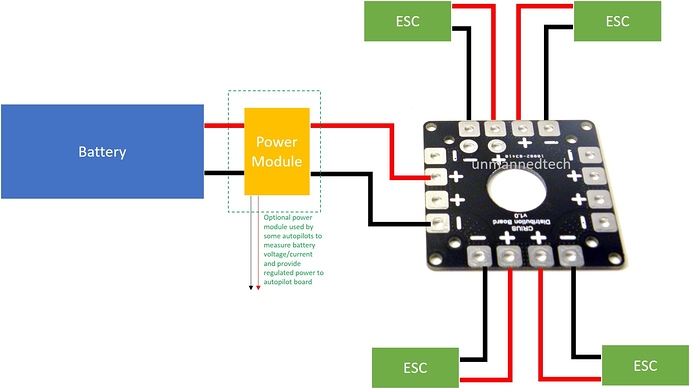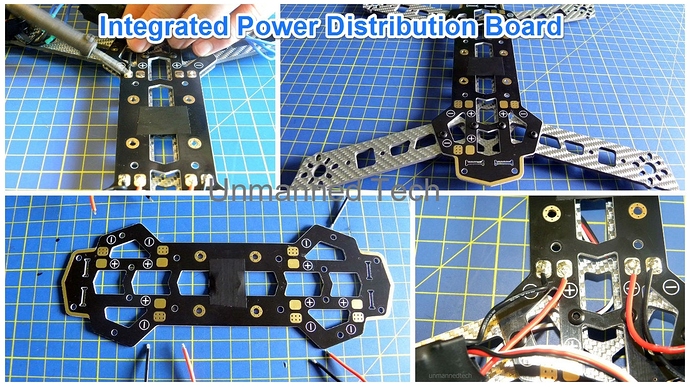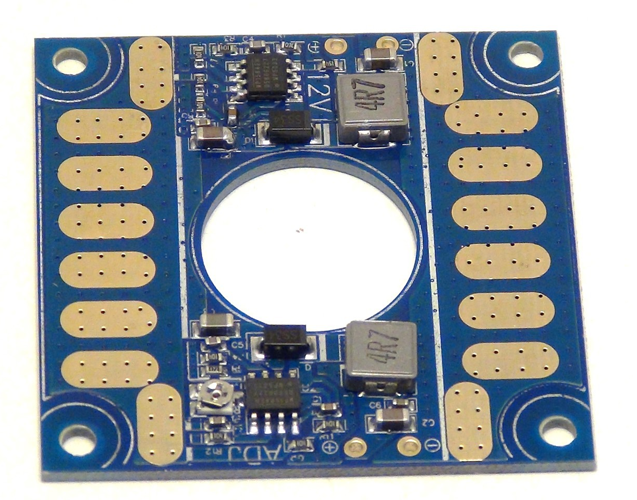Power Distribution Boards – How to choose the right one Leave a comment

In this guide we will discuss everything there is to do with power distribution boards (or PDB for short), what they do, how they work and how to go about choosing one for your multirotor drone build.
What is a Power Distribution Board?
PDB’s are often an overlooked area of multirotor drone building, mainly because they are fairly simple but despite this they are a crucial part of your drone and if you don’t choose the right one you could end up loosing your drone.
As the name suggests, a PDB distribute the power on your drone, and provides a neat and tidy way of connecting your battery to all of your ESC’s on your aircraft. A PDB has positive pads/terminals which are all connected and negative terminals/pads which are all connected. This way when you solder all of the red wires from your ESC’s and battery to the positive pads on the PDB, and the black wires to all the negative pads, they will all become connected so your battery can provide power to all of your ESC’s as shown in the image below.

Power-distribution-board-wiring.jpg1970×1110 172 KB
Stand alone or integrated PDB
Some multirotor frames has a power distribution board integrated into the frame, allowing you to solder the battery and ESC connectors directly onto the main frame of your drone which is very convenient. Integrated PDB boards can only be used with fibreglass plates, as carbon fiber conducts electricity, making it impossible to have a carbon fiber PDB. For this reason all carbon fiber quadcopters have a separate power distribution board which you mount onto your multirotor frame.

Integrated-PDB.jpg1366×768 894 KB
How Does it Work?
There is not much to a PDB as its simply a basic circuit board that connects all the ground connectors to one another and all the positive connectors together allowing you to power all of the equipment on your drone in a neat and easy manner instead of having a birds nest of power cables going between all your gear.
Voltage Regulator
Some PDB boards aso include a voltage regulator, also known as a BEC. A voltage regulator is a small circuit that regulates the voltage to a specific value, commonly 5V, or 12V. So if you are using a 4S LiPo battery (which is 14.8V) the voltage regulator will convert that voltage and output a constant 12V, or 5V that you can use to power certain equipment such as LED lights, or FPV equipment which is a very usefull feature as not all equipment on your drone will be able to work on 14.8V. The PDB that is shown below 414 includes two voltage regulating circuits, one of them provides a constant 12V output, while the others is adjustable to whatever voltage you require.

Pasted image1224×960 1.7 MB
How to choose a Power Distribution Board
There are three main factors to consider when it comes to choosing a PDB for your drone. Even though some multirotor frame kits include a PDB, or have one integrated inside one of hte frame plates its still a good idea to check the specs to ensure it will work with your motors/ESC.
Current Rating
The main safety aspect in terms of choosing a PDB for your drone is to make sure the PDB can handle the amount of current that is required to pass though it. The way to work this out is fairly easy, you simply need to check the ratings of your ESC’s on your multicopter to find the maximum total current draw. So if we are building a quadcopter that uses 4x 20A ESC’s we ideally need to have a PDB that can handle (4x20A) 80A. However in reality we will not be flying our quadcopter at max throttle so you could get away with a 60A PDB, but in my opinion its always best to spend abit more and use a over rated PDB as its worth the extra safety factor.
Number of connectors
A fairly obvious thing to consider is to make sure the PDB has sufficient connectors for all of your ESC’s so you can easily solder everything to your board.
Voltage Regulator
As mentioned before having a voltage regulator onboard the PDB provides a convenient way to power auxiliary equipment on your multirotor drone such as external LED’s or FPV equipment.
So now that you know the basics of what a PDB is, hopeful you will be able to be better informed when it comes to choosing a PDB for your next multirotor drone build. If you ever have any questions, or comments just add them below.
